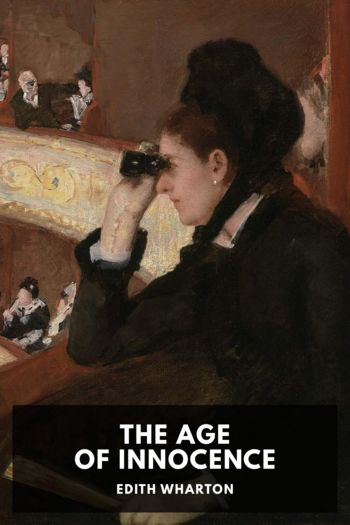The Age of Innocence, Edith Wharton [best 7 inch ereader txt] 📗

- Author: Edith Wharton
Book online «The Age of Innocence, Edith Wharton [best 7 inch ereader txt] 📗». Author Edith Wharton
There was a certain triteness in these reflections: they were those habitual to young men on the approach of their wedding day. But they were generally accompanied by a sense of compunction and self-abasement of which Newland Archer felt no trace. He could not deplore (as Thackeray’s heroes so often exasperated him by doing) that he had not a blank page to offer his bride in exchange for the unblemished one she was to give to him. He could not get away from the fact that if he had been brought up as she had they would have been no more fit to find their way about than the Babes in the Wood; nor could he, for all his anxious cogitations, see any honest reason (any, that is, unconnected with his own momentary pleasure, and the passion of masculine vanity) why his bride should not have been allowed the same freedom of experience as himself.
Such questions, at such an hour, were bound to drift through his mind; but he was conscious that their uncomfortable persistence and precision were due to the inopportune arrival of the Countess Olenska. Here he was, at the very moment of his betrothal—a moment for pure thoughts and cloudless hopes—pitchforked into a coil of scandal which raised all the special problems he would have preferred to let lie. “Hang Ellen Olenska!” he grumbled, as he covered his fire and began to undress. He could not really see why her fate should have the least bearing on his; yet he dimly felt that he had only just begun to measure the risks of the championship which his engagement had forced upon him.
A few days later the bolt fell.
The Lovell Mingotts had sent out cards for what was known as “a formal dinner” (that is, three extra footmen, two dishes for each course, and a Roman punch in the middle), and had headed their invitations with the words “To meet the Countess Olenska,” in accordance with the hospitable American fashion, which treats strangers as if they were royalties, or at least as their ambassadors.
The guests had been selected with a boldness and discrimination in which the initiated recognised the firm hand of Catherine the Great. Associated with such immemorial standbys as the Selfridge Merrys, who were asked everywhere because they always had been, the Beauforts, on whom there was a claim of relationship, and Mr. Sillerton Jackson and his sister Sophy (who went wherever her brother told her to), were some of the most fashionable and yet most irreproachable of the dominant “young married” set; the Lawrence Leffertses, Mrs. Lefferts Rushworth (the lovely widow), the Harry Thorleys, the Reggie Chiverses and young Morris Dagonet and his wife (who was a van der Luyden). The company indeed was perfectly assorted, since all the members belonged to the little inner group of people who, during the long New York season, disported themselves together daily and nightly with apparently undiminished zest.
Forty-eight hours later the unbelievable had happened; everyone had refused the Mingotts’ invitation except the Beauforts and old Mr. Jackson and his sister. The intended slight was emphasised by the fact that even the Reggie Chiverses, who were of the Mingott clan, were among those inflicting it; and by the uniform wording of the notes, in all of which the writers “regretted that they were unable to accept,” without the mitigating plea of a “previous engagement” that ordinary courtesy prescribed.
New York society was, in those days, far too small, and too scant in its resources, for everyone in it (including livery-stable-keepers, butlers and cooks) not to know exactly on which evenings people were free; and it was thus possible for the recipients of Mrs. Lovell Mingott’s invitations to make cruelly clear their determination not to meet the Countess Olenska.
The blow was unexpected; but the Mingotts, as their way was, met it gallantly. Mrs. Lovell Mingott confided the case to Mrs. Welland, who confided it to Newland Archer; who, aflame at the outrage, appealed passionately and authoritatively to his mother; who, after a painful period of inward resistance and outward temporising, succumbed to his instances (as she always did), and immediately embracing his cause with an energy redoubled by her previous hesitations, put on her grey velvet bonnet and said: “I’ll go and see Louisa van der Luyden.”
The New York of Newland Archer’s day was a small and slippery pyramid, in which, as yet, hardly a fissure had been made or a foothold gained. At its base was a firm foundation of what Mrs. Archer called “plain people”; an honourable but obscure majority of respectable families who (as in the case of the Spicers or the Leffertses or the Jacksons) had been raised above their level by marriage with one of the ruling clans. People, Mrs. Archer always said, were not as particular as they used to be; and with old Catherine Spicer ruling one end of Fifth Avenue, and Julius Beaufort the other, you couldn’t expect





Comments (0)